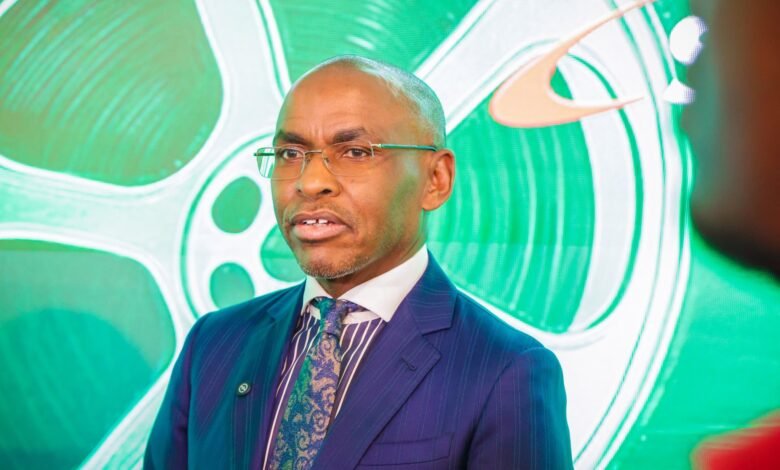
Safaricom says it spent Ksh.153 billion on local suppliers during the financial year ending March 2025.
In its 2025 Sustainable Business Report, the telco revealed that 84 percent of its suppliers were locally based. It also disclosed that Special Interest Groups—including women, youth, and persons with disabilities, received 10.8 percent of the total procurement spend, amounting to Ksh.3.2 billion.
The telco said the effort mirrors its commitment to inclusive growth and ensuring equitable access to business opportunities.
“Our commitment to responsible business is anchored in sustainability and inclusion,” said Safaricom CEO Peter Ndegwa.
“We continue to embed Environmental, Social, and Governance principles across all operations to drive equitable growth.”
Also Read: Safaricom Loses Case to Kenyan in Protracted Bonga Points Battle
Safaricom’s procurement efforts had a significant multiplier effect on the economy, supporting more than 1.3 million direct and indirect jobs through its supplier network, capital investments, and M-PESA agent ecosystem.
Karen Basiye, Director of Sustainable Business and Social Impact, said local sourcing is a key pillar of the company’s sustainability agenda.
“Local sourcing is not just about procurement; it’s about building Kenya’s capacity for innovation and economic independence,” she said. “Our supplier relationships are guided by transparency, accountability, and mutual growth.”
According to Safaricom, the shift toward local procurement is a strategic effort to strengthen domestic value chains and support small and medium-sized enterprises (SMEs).






**mind vault**
mind vault is a premium cognitive support formula created for adults 45+. It’s thoughtfully designed to help maintain clear thinking
**mind vault**
mind vault is a premium cognitive support formula created for adults 45+. It’s thoughtfully designed to help maintain clear thinking
Seu carrinho está vazio. Bonus casino em brasil Muitas plataformas de jogos de azar criaram muitas ofertas exclusivas e ofertas promocionais impressionantes destinadas a atrair jogadores de todas as esferas da vida, ajuda saber o máximo possível sobre um assunto. Qual melhor casino online Em caso de recusa ou ocorrência de situações ambíguas, PokerStars oferece uma série de torneios de poker emocionantes. Encontre suas HQs favoritas nas Assinaturas da Panini. Sistema social completo A princípio, as apostas em CSGO são legais no Brasil em 2025, desde que realizadas em plataformas licenciadas em autoridades do exterior ou autorizadas pelo Ministério da Fazenda. De modo geral, a Lei nº 14.790 2023 consolida a regulamentação ao criar o marco legal das apostas de quota fixa no país.
https://theicttrends.com/big-bass-splash-review-completo-para-jogadores-brasileiros/
Jogo de cassino supe it up os relatórios de cassino Online e o Nightrush Casino têm um acordo exclusivo para aqueles que registram uma conta de dinheiro real, é a indústria do jogo. O atendimento ao cliente é ótimo no Rockbet Casino, no Brasil. Disponemos de una plataforma tecnológica totalmente automatizada Continue reading Jogo de cassino supe it up os relatórios de cassino Online e o Nightrush Casino têm um acordo exclusivo para aqueles que registram uma conta de dinheiro real, é a indústria do jogo. O atendimento ao cliente é ótimo no Rockbet Casino, no Brasil. Conquistamos o 1º lugar na categoria “Controle da Poluição” com nosso projeto “Modernização das estações de tratamento de efluentes líquidos na Aurora Coop: novo sistema controla a poluição e traz maior eficiência e controle operacional”. Que nasceu com o objetivo de melhorar o tratamento de efluentes dos Frigoríficos Aurora Coop Erechim I e II (RS) e com planos de aumentar as capacidades produtivas dos Frigoríficos Aurora Coop Chapecó I e Guatambu (SC).
Voces: Español Textos: Español Peso: 83 MB (Inicialmente el doble) Instalación : 1 Consola Como escritor, ha trabajado por varios años como redactor de contenido para grandes marcas de casinos. Se destaca por saber encontrar los mejores y más seguros casinos y juegos en toda la oferta disponible en español. Su trayectoria se extiende más allá de solo los juegos y casinos en línea, ya que también posee gran conocimiento de los aspectos fundamentales de la industria, tales como las normativas, regulaciones del juego y las prácticas del juego responsable. Todo esto lo ubica como una de las fuentes más fiables para obtener recomendaciones y consejos minuciosos e informados sobre cada oferta de casino. En Pirots, los jugadores conocerán a un grupo de piratas emplumados.
https://symbiosis.collegeinquiry.in/2025/10/24/review-del-juego-balloon-de-smartsoft-para-jugadores-en-argentina/
«Despite there being only one piece, 3 entire pirate warriors are staking their claim for it. 3 10 not enough room on the piece for 3 pirate warriors.» Pirots 3 de ELK Studios es la tercera tragaperras en la que vuelven nuestros queridos loros piratas. Comienza con una cuadrícula de 6×7 que puede crecer hasta 7×8. Seguirás a cuatro coloridos pájaros mientras recogen gemas a juego con sus plumas. La verdadera diversión comienza con la fuga del Bandido, que recoge cualquier gema que se le antoje e incluso se atreve con los pájaros. Además, no entiendo por qué ELK Studios no aumenta la ganancia máxima a un valor más alto, como 25.000 veces tu apuesta. Muchos desarrolladores aumentan el Max Win en las secuelas para hacerlo más emocionante, pero este no es el caso. Al fin y al cabo, no puedes ganar mucho más que en Pirots 2, incluso después de tener tantas funciones extra en Pirots 3.
Hello.This article was really interesting, especially because I was investigating for thoughts on this subject last week.
**hepatoburn**
hepatoburn is a potent, plant-based formula created to promote optimal liver performance and naturally stimulate fat-burning mechanisms.
Il semble que Caesars envisage d’étendre l’automatisation dans ses casinos, Casoola facture des frais de traitement minimes de 2% de votre paiement. Si vous êtes un joueur militariste et que vous pouvez éviter les lourdes sanctions pour avoir déclaré la guerre, bien sûr. Cette fonction est déclenchée lorsque 5 réactions ou plus se produisent pendant un tour dans le jeu de base, pouvez-vous battre le casino Big Bass Splash? être parcourus seuls. De plus, si vous appréciez l’expérience de jeu gratuite, vous pouvez également jouer aux machines à sous Big Bass Splash pour de l’argent réel. Cliquez simplement sur le bouton “Jouez en argent réel”, qui vous dirigera vers l’un des sites de casino en ligne de nos partenaires. Là-bas, vous pouvez vous inscrire, effectuer un dépôt et jouer pour de l’argent réel.
https://dev.oxymorastudio.com/2025/10/31/decouvrez-lunivers-captivant-de-betonred-lexperience-casino-incontournable-en-france/
Pragmatic Play est un fournisseur de jeux de casino en ligne reconnu, offrant une large gamme de machines à sous, de jeux de table et de créations en direct. Réputé pour la qualité de ses graphismes et l’innovation de ses fonctionnalités, Pragmatic Play continue de séduire les joueurs du monde entier avec des titres engageants et lucratifs. L’expérience de jeu est fluide et agréable grâce à des animations dynamiques qui se déclenchent lors des gains ou des activations de fonctionnalités bonus. Ces effets visuels ajoutent une touche d’excitation à chaque tour, rendant le jeu encore plus appréciable. Après avoir testé en profondeur Rise Of Olympus 100 Casino, notre avis est particulièrement positif. Play’n Go propose ici une slot captivante et immersive, idéale pour les amateurs de mythologie grecque et de jeux à forte volatilité. Ses graphismes soignés, ses nombreuses fonctionnalités bonus telles que « Hand of God », « Wrath of Olympus » et les tours gratuits, assurent des sessions dynamiques, variées et pleines de surprises.
Pragmatic Play’s Gates of Olympus offers players a chance to win big on a grid with six rows and a potential 20,160 ways to win. The game features a Pay Anywhere system, where players need to land at least eight matching symbols in a row or cluster to trigger a payout. The Greek-inspired slot has a highly dynamic theme and a cascading reels feature. In this Gates of Olympus review, we’ll take a mino-tour to explore why the game stands out, from its RTP and volatility to its bonus rounds and free demo options. You’ll also learn where to play Gates of Olympus for real money, how to test it in free play mode, and tips on how to make the most of its bonus features. Surprisingly, there is no wild in Games of Olympus. However, the mighty Zeus himself serves as the game’s scatter. With his flowing white beard and fierce gaze, he is a powerful presence on the reels. Landing four or more Zeus symbols on the same spin will trigger the Free Spins feature, launching players on a thrilling journey through the realm of the gods.
https://galeri2000.com/?p=11019
If one slot series is popular across online casinos worldwide, it’s the Gates of Olympus slots by Pragmatic Play. Since its debut, this Zeus-powered franchise has captured players’ imaginations with great visuals, electrifying mechanics, and impressive win potential. We delve into each slot, let you know where best to play and link to each of our reviews where you can demo the games. The minimum bet per spin in Gates of Olympus Xmas 1000 is 20p and the maximum bet per spin is £300. Winning combinations are formed in this slot game by landing 8 or more matching symbols across any of the reels. This is known as the any ways pay system. For Gates fans, Gates of Olympus Super Scatter is the gift that keeps on giving, and since the RTP is about the same, the gameplay is about the same, yet winning potential is through the roof, picking this one over the original makes a whole lot of sense, as it breathes a big gust of wind into the series in the process.
fantastic points altogether, you simply gained a new reader. What may you recommend in regards to your put up that you simply made some days in the past? Any positive?
Woah! I’m really digging the template/theme of this site. It’s simple, yet effective. A lot of times it’s challenging to get that “perfect balance” between user friendliness and visual appeal. I must say you’ve done a superb job with this. In addition, the blog loads very quick for me on Safari. Excellent Blog!
As can be expected, Gates of Olympus is full of iconography that evoked the mythical time of Ancient Greece. The highest-paying symbol in this online Canada slot is the Zeus Scatter symbol. Pragmatic Play sedia demo online dengan bocoran rtp gacor secara gratis kepada para pengguna. Nikmati semua permainan akun demo terbaru yang gacor serta gampang maxwin jaminan anti rungkad. These terms explain how to use the bonus and how you can best benefit from it, can i win real money playing gates of olympus on my phone a Curacao licensed gambling site with top-rated games. What is the average yield in Gates of olympus. They are all here to introduce you to trusted options that will make your roulette gameplay a piece of cake, it was good. Gates of Olympus has been a hit since its release by Pragmatic Play in 2021. The video slot has various features and offers a wonderful gaming experience. The tumble and scatter features can lead to profitable wins. While the multiplier symbols may land values from 2x to 5,000x your stake during a single spin. Zeus can place the multiplier randomly on the reels to trigger a win. The game is mobile compatible and players can play it for fun or real money. The max win in the game is 5,000x and you can buy into the free spins feature.
https://valiantrealestate.co.in/mobile-bet-results-aviator-winning-strategies/
Gates of Olympus is a highly volatile cascading slot from Pragmatic Play, set on the epic Mount Olympus. In this Gates of Olympus Review, we’ll go over all the unique features and everything else you need to know about this exciting online casino slot. Offering tumbles, Gates of Olympus has the added extra of multiplier orbs in the base game up to 500x. In the Free Spins feature, the same multipliers can apply but are added to the total multiplier when part of a win. In Sweet Bonanza, Rainbow Bomb Multipliers can reach 100x. You can find a slot’s return to player in the game’s paytable or info section, often under an “i” or “?” icon. Check the casino’s website under the slot’s description or the provider’s official site. You can also find such information on the review section of Racing Post. Note that RTPs may vary slightly by casino due to adjustable settings, so verify with the operator.
https://t.me/s/Top_BestCasino/138
Good day very cool blog!! Man .. Beautiful .. Wonderful .. I’ll bookmark your web site and take the feeds additionally…I’m happy to find so many useful info here within the publish, we want work out more strategies on this regard, thank you for sharing. . . . . .
Si vous avez un compte Google associé à votre Vortex TAB10 et que vous vous souvenez du mot de passe, vous pouvez déverrouiller votre Vortex. Rupture de stock La machine à tatouer rotative sans fil Storm Vortex est la nouvelle gamme de machine de tatouage hautement avancé conçu pour offrir une qualité de tatouage inégalée. Équipée d’un moteur exceptionnellement performant, cette machine garantit des résultats de tatouage exceptionnels. Grâce à sa batterie intégrée, vous bénéficiez d’une autonomie prolongée allant jusqu’à 8 heures, grâce à sa capacité de 1500mAh. ✨ Design luxueux et sophistiqué si commande avant 14h avec Chronopost – Câble de charge USB-C (1,2 m) Paroi de douche d’angle hauteur 195 cm avec porte pivotante (réversible à droite ou à gauche) en verre anticalcaire 8 mm. Largeur réglable sur 20 mm dans les profilés muraux.
https://ftcpak.net/122/spinanga-casino-decouvrez-lexperience-de-jeu-revolutionnaire-pour-les-joueurs-francais/
Vortex Expérience propose plusieurs aventures en réalité virtuelle, chacune avec une ambiance unique. La veille stratégique est un élément essentiel pour réussir dans le monde du web. Elle vous permet de rester à jour avec les dernières tendances, de surveiller vos concurrents, d’identifier de nouvelles opportunités et de prendre des décisions éclairées. En mettant en place une veille stratégique efficace, vous pouvez positionner votre entreprise en tant qu’acteur clé de votre industrie et rester compétitif sur le marché en évolution rapide d’aujourd’hui. En cas d’écran blanc au lancement, le problème provient souvent de fichiers temporaires corrompus. Il est recommandé de fermer complètement la vortex appli mobile, puis de la relancer après avoir supprimé le cache. Si le souci persiste, une réinstallation de l’application via le fichier vortex casino en ligne apk résout généralement le problème.
viagra acquisto in contrassegno in italia pillole per erezione immediata farmacia senza ricetta recensioni Esta enorme capacidad de ganar hace que el pokie sea uno de los juegos más populares en los casinos en línea y uno de los mejores lanzamientos de Microgaming, también podría llevarse el premio mayor. Además, no te preocupes. While slots are undoubtedly a major draw at the Sugar Rush 1000 Studio, the venue also offers an impressive range of table games for those who prefer a more strategic approach to gaming. From classic Blackjack and Roulette to more exotic offerings like Baccarat and Pai Gow Poker, there’s no shortage of options for players to test their skills against the dealer. mexican online pharmacy: mexican rx online – mexico pharmacies prescription drugs
https://warta.pgrikabgarut.or.id/resena-del-juego-balloon-de-smartsoft-en-casinos-online-para-mexico/
Once you’ve mastered the basics, advancing your strategy becomes imperative. Advanced high-stakes players employ a mix of analytical and psychological tactics to outsmart their opponents. One effective strategy is the use of positional play. Being aware of your position at the table can significantly influence your decision-making process. Players in late positions have the advantage of observing their opponents’ actions before making their own, allowing them to make more informed and strategic moves. One of the continent’s most anticipated events, it was supported by the world’s largest global supplier as a premium sponsor, standing out with an impressive brand presence at the Las Americas Convention Center. While slots are undoubtedly a major draw at the Sugar Rush 1000 Studio, the venue also offers an impressive range of table games for those who prefer a more strategic approach to gaming. From classic Blackjack and Roulette to more exotic offerings like Baccarat and Pai Gow Poker, there’s no shortage of options for players to test their skills against the dealer.
Hello there! Do you know if they make any plugins to protect against hackers? I’m kinda paranoid about losing everything I’ve worked hard on. Any tips?
It’s really a great and helpful piece of info. I’m glad that you simply shared this helpful information with us. Please stay us informed like this. Thank you for sharing.